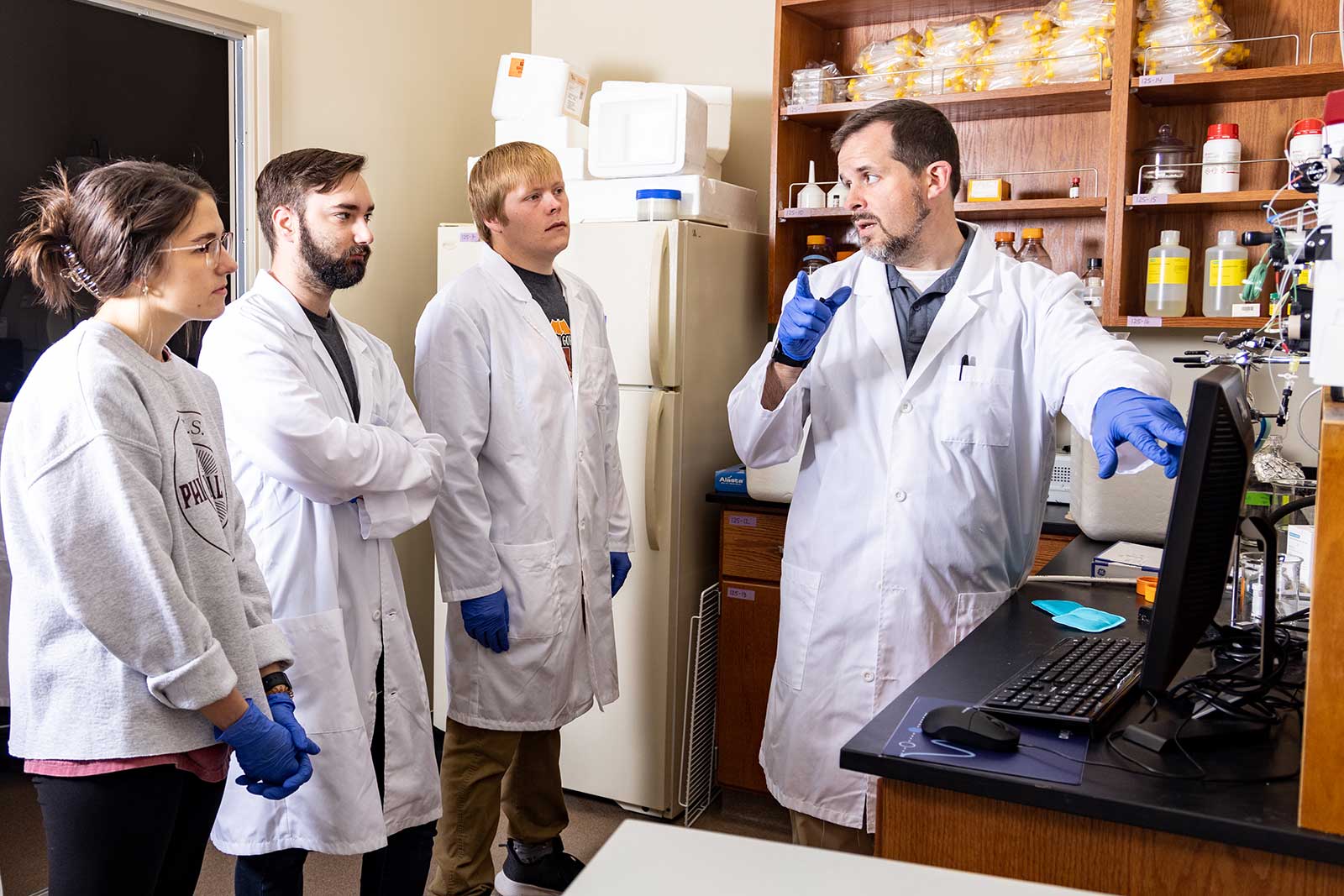Undergraduate Research Experience
Advancing the world of research
The Freed-Hardeman Undergraduate Research Experience was created to provide an arena that fosters undergraduate research in a well-equipped laboratory facility for students and faculty in their collaborative pursuit of innovative solutions to the myriad of scientific challenges faced in today’s technologically advanced world.

The History
In the fall of 2005, the Research Center was founded for the purpose of engaging undergraduates in scientific research. In the fall of 2012, the Anderson Science Center was completed and opened for classes and research. The lab facilities housed in the old Research Center were moved to the state-of-the-art laboratories within the Anderson Science Center. The Research Center was then renamed the Freed-Hardeman Undergraduate Research Experience to better reflect the scope of scientific research occurring on campus.

The Research
Our students do not just study other scientists’ research; our students are given the chance to be researchers. Much like graduate level research, our students write procedure, analyze results, propose alternate methods, and present their work at conferences.
The Students
Students design many of the research projects. Students also have the chance to work with expert faculty. Student-suggested research is coordinated with the help of a faculty mentor in a related field. Other research opportunities are available for students to work on current faculty projects.
The Equipment
Our facility is open year-round for students and faculty, and it houses scientific equipment, including modern cellular and molecular biology equipment.
Purposes of Undergraduate Research
- to enable students to pursue individual interests in the sciences through faculty-guided, student-suggested research projects
- to allow further study of areas of science briefly addressed in the general class setting
- to challenge motivated students as they seek to identify their particular areas of scientific interest
- to solicit funding for undergraduate research
Biology Research
Anderson Pond Research
Research projects are focused on studying the Anderson Pond. One project involves looking at a longitudinal study of the water-chemical parameters. A second project is an attempt to identify and enumerate the different physiological groups of bacteria in the pond. Future research will focus on identifying bacteria from turtles. Dr. Paul Fader is mentor of the team conducting this research.
Turtle Ecology
Our research is conducted in a series of three ponds located in the FHU wetland area. Turtles are systematically captured and a series of morphological measurements are collected from each turtle. Turtles are then permanently marked and released at the site of capture. Data collected from this study are used to evaluate population structures, growth rates, movements, and survivorship among turtle species. This study was begun in 1998, and over 200 turtles have been marked to date.
We are also members of the North American Freshwater Turtle Research Group. The NAFTRG consists of professional biologists and volunteers from across the country who are conducting long-term turtle community studies in Florida, Texas, and Horse Creek in Hardin County, Tennessee. Dr. Brian Butterfield is the faculty mentor of the team conducting this research.
Biology of Invasive Species
Over 40 reptile species have invaded the southeastern U.S. Among these are several gecko species. Our research is designed to identify behaviors that influence invasive characteristics and subsequent geographic expansion among invasive gecko species. Dr. Brian Butterfield is the faculty mentor of the team conducting this research.
Geographic Distribution of Amphibians and Reptiles in West Tennessee
Our research involves documenting the occurrence of species previously unknown to science from specific areas. Our work has documented the occurrence of several species in new areas including two species found near our campus in Chester County. Dr. Brian Butterfield is the faculty mentor of the team conducting this research.
Pathogenesis of Soft Rot Bacteria
Our research team is investigating the genetic regulation of Pectobacterium carotovorum, specifically those genes whose function is linked to the production of plant cell wall degrading exoenzymes. We are collaborating with Dr. Korsi Dumenyo, a bacterial geneticists at Tennessee State University. Dr. Caleb Kersey is mentor of the team conducting this research.
Structure, Function and Regulation of Topoisomerase II
The focus of this research is on examining how the enzyme is controlled and regulated specifically through post-translational modifications and protein-protein interactions. This work involves experiments with purified topoisomerase II and includes site-directed metagenesis, DNA and protein purification, gel electrophoresis, PCR/RT-PCR and other methods. Dr. Joe Deweese is the research mentor overseeing this work.
PSI-Calc: A Bioinformatics Tool for Studying Protein Sequence Interdependencies
Still Deciding on a major?
